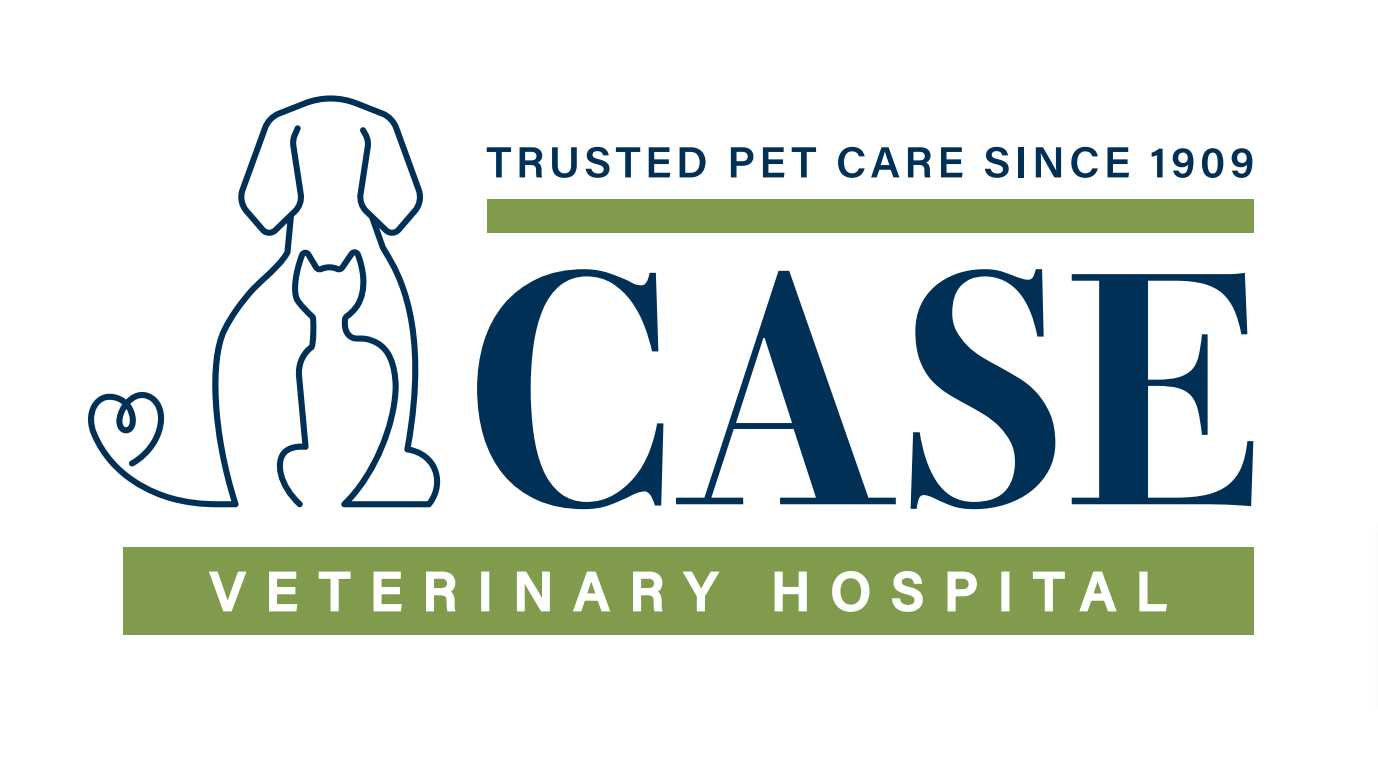How can I donate?
We often have clients ask if there is a way they can donate to give back that will benefit other pets in Savannah, GA. Often this request occurs after the loss of a pet and is intended to serve as a memorial for their loved one. Below we have listed some of the ways that you can donate, both monetary and otherwise.
The Veterinary Care Foundation
The Veterinary Care Foundation is a 501(c) (3) charitable foundation created to offer financial support to individual veterinary practices that provide help to abandoned pets or those experiencing a significant financial crisis. The financial decisions that must be made when a pet is ill or needs surgery can further compound the sorrow felt when a pet is sick. All of us at Case Veterinary Hospital wish we could provide our services for free. Still, the reality is that we must collect our fees in order to be able to remain in business and offer the high standards of care that we believe every pet deserves. Donations made to this organization allow those who have been financially blessed to bless others who are less fortunate but want to provide care for their pet. Our clients can direct their donations to our hospital so that our veterinarians can use the funding for those clients they feel are in need of extra funds. We love this idea because you can get the tax benefit from your donation, and you know our doctors will use the funds in a way that will benefit those in need the most. You can be assured that the funds will be used at our veterinarians’ discretion to help pets in need.
If you wish to donate to this fund, please go to the link here and use our hospital name. You can also speak with our Office Manager or with one of our veterinarians at our animal hospital. Animals enrich each of our lives in such a profound way and this is a wonderful opportunity to “pay it forward”.
https://veterinarycarefoundation.org/donate-today/veterinary-practice/
Towels and Newspapers
Our pet hospital can always benefit from towels and newspapers for our boarding and hospitalized patients. Donations of these items are much appreciated.
Pets Peace of Mind
We recently partnered with Hospice of Savannah to help those under hospice care be able to maintain the relationship they have with their pets through volunteers and veterinary support. Donations can be sent to Hospice of Savannah-PPOM program: http://hospicesavannah.org
What exams and vaccines does my dog need?
A Lifetime Of Canine Wellness
6-8 Weeks
- Comprehensive Physical Exam
- DHPP vaccine
- Bordetella bronchiseptica (Kennel Cough) vaccine
- Internal Parasite exam (Fecal Floatation)
- De-worming for internal parasites
- Heartworm and Flea Prevention
- Discuss topics: house/crate training, behavior, etc.
- Answer any questions about your pet.
9-11 Weeks
- Comprehensive Physical Exam
- DHLPP vaccine
- Internal Parasite exam (Fecal Floatation)
- De-worming for internal parasites
- Discuss topics: house/crate training, behavior, etc
- Answer any questions about your pet.
12-15 Weeks
- Comprehensive Physical Exam
- DHLPP vaccine
- Internal Parasite exam (Fecal Floatation)
- De-worming for internal parasites
- Discuss topics: house/crate training, behavior, etc
- Answer any questions about your pet.
16 Weeks and older
- Comprehensive Physical Exam
- DHLPP vaccine
- Rabies vaccine
- Internal Parasite exam (Fecal Floatation)
- De-worming for internal parasites
- Discuss topics: house/crate training, behavior, etc
- Answer any questions about your pet.
6 Months
Spay or Neuter to decrease health risks, discourage undesirable behaviors, and to help prevent pet overpopulation.
Avid microchip: Statistics show one out of three family pets will be lost.
Adult Pets 1 to 7 Years
This is a general age range. Some breeds mature and age faster than others.
First Wellness Exam
- Comprehensive Physical Exam
- Oral exam to check teeth and gums
- Vaccinations based on risk assessment
- Internal Parasite exam
- CDC recommends every 6 months
- Heartworm test
- Breed-specific characteristics
- Home dental care
- Nutrition discussion including weight management
- Wellness blood/urine baseline screen
- At least once before age 7
Second Wellness Exam, 6 months later
- Comprehensive Physical Exam
- Oral exam to check teeth and gums
- Home dental care
- Nutritional discussion including weight management
- Vaccinations based on risk assessment
- Bordetella bronchiseptica (Kennel Cough) vaccine is recommended every 6 months
- Internal Parasite exam
- CDC recommends every 6 months
- Wellness blood/urine baseline screen
- At least once before age 7
Senior Pets age 8 Years and Up
This is a general age range. Some breeds mature and age faster than others.
First Wellness Exam
- Comprehensive Physical Exam
- Oral exam to check teeth and gums
- Arthritis exam
- Vaccinations based on risk assessment
- Internal Parasite exam
- CDC recommends every 6 months
- Heartworm test
- Breed-specific characteristics
- Nutrition discussion and weight management
- Senior/Prescription diet
- Home dental care discussion
- Senior wellness blood/urine screen
- Recommend every year after age 8
Second Wellness Exam, 6 months later
- Comprehensive Physical
- Oral exam to check teeth and gums
- Arthritis exam
- Vaccinations based on risk assessment
- Bordetella bronchiseptica (Kennel Cough) vaccine is recommended every 6 months
- Internal Parasite exam
- CDC recommends every 6 months
- Nutrition discussion and weight management
- Home dental care discussion
- Senior wellness blood/urine screen
- Recommend every year after age 8
What exams and vaccines does my cat need?
A Lifetime Of Feline Wellness
6-8 Weeks
- Comprehensive Physical Exam
- FVRCP vaccine
- Internal Parasite exam (Fecal Floatation)
- De-worming for internal parasites
- Heartworm and Flea Prevention (Revolution)
- Discuss topics: litterbox training, behavior, etc.
- Answer any questions about your pet.
9-11 Weeks
- Comprehensive Physical Exam
- FVRCP vaccine
- Feline Leukemia (FeLV) vaccine
- FeLV-FIV (Feline Immunodeficiency Virus) testing
- Internal Parasite exam (Fecal Floatation)
- De-worming for internal parasites
- Discuss topics: litterbox training, behavior, etc.
- Answer any questions about your pet.
12-15 Weeks
- Comprehensive Physical Exam
- FVRCP vaccine
- Feline Leukemia (FeLV) vaccine
- Internal Parasite exam (Fecal Floatation)
- De-worming for internal parasites
- Discuss topics: litterbox training, behavior, etc.
- Answer any questions about your pet.
16 Weeks and older
- Comprehensive Physical Exam
- FVRCP vaccine
- Rabies vaccine
- Internal Parasite exam (Fecal Floatation)
- De-worming for internal parasites
- Discuss topics: litterbox training, behavior, etc.
- Answer any questions about your pet.
6 Months
- Spay or Neuter to decrease health risks, discourage undesirable behaviors, and help prevent pet overpopulation.
- If you choose to have your kitten declawed, we strongly recommend only the front paws.
- Avid microchip: Statistics show one out of three family pets will be lost.
Adult Pets 1 to 7 Years
First Wellness Exam
- Comprehensive Physical Exam
- Oral exam to check teeth and gums
- Home Dental Care
- Nutrition discussion and weight management
- Vaccinations based on risk assessment
- Breed-specific characteristics
- Internal Parasite exam
- CDC recommends every 6 months
- Wellness blood/urine baseline screen
- At least once before age 7
Second Wellness Exam, 6 months later
- Comprehensive Physical
- Oral exam to check teeth and gums
- Home Dental Care
- Vaccinations based on risk assessment
- Internal Parasite exam
- CDC recommends every 6 months
- Wellness blood/urine baseline screen
- At least once before age 7
Senior Pets age 8 Years and Up
First Wellness Exam
- Comprehensive Physical Exam
- Oral exam to check teeth and gums
- Vaccinations based on risk assessment
- Internal Parasite exam
- CDC recommends every 6 months
- Nutrition discussion and weight management
- Senior/Prescription diet
- Home dental care discussion
- Senior wellness blood/urine screen
- Recommended every year after age 8
Second Wellness Exam, 6 months later
- Comprehensive Physical
- Oral exam to check teeth and gums
- Vaccinations based on risk assessment
- Internal Parasite exam
- CDC recommends every 6 months
- Nutrition discussion and weight maintenance
- Senior /Prescription Diets
- Home dental care discussion
- Senior wellness blood/urine screen
- Recommend every year after age 8
What can I expect during my pet's teeth cleaning?
So Your Pet Needs A Teeth Cleaning
This is what you can expect:
Prior to anesthesia, your pet will have pre-anesthetic lab work performed. Your pet’s doctor will determine the type of labwork done based on your pet’s age and health status. If the doctor tells you that your pet will need a “health screen,” it will be performed the same day of the dental cleaning. If your pet needs to have a more extensive “general wellness profile,” please bring your pet in one week before the dental cleaning so that we can submit that bloodwork to the laboratory and get the results back in time for your pet’s dental work. If it is not possible for you to come in before the dental work, we can perform this same bloodwork in our laboratory on the morning of the procedure. Please note that if we do the bloodwork in our laboratory, it is more expensive than if we have the time to outsource it to our outside lab.
On the morning of the procedure, your pet will need to be at Case Veterinary Hospital between 7:30 – 8:30 AM, and a technician will discuss the procedure and answer any questions you may have. Your pet will need to arrive with an empty stomach, so do not feed any food after 10 PM the night before arrival. They may, however, have water.
After the doctor examines your pet, a pre-anesthetic medication is given that calms them down and eases the transition into anesthesia. Depending on your pet’s age and health status, the doctor may decide to insert an intravenous catheter prior to anesthesia and keep them on intravenous fluids throughout the procedure. Your pet is then put under general anesthesia, and an endotracheal tube is inserted into the “wind-pipe” to keep the airways open. Patients breathe in an anesthetic gas to stay asleep, and their vital signs are carefully monitored. The doctor will also give an antibiotic injection.
During a dental cleaning, the teeth are scaled and polished, much like what occurs at your own human dentist. Please note that when your pet is asleep, and we are able to get a very close look at the teeth, we sometimes find abnormalities that we did not expect prior to anesthesia. In these instances, we may need to perform dental x-rays to make sure that the teeth are not only healthy above the gumline but below the gumline as well. There may also be diseased teeth that need to be removed or extracted. While we make every effort to perform as many procedures as we can at one time, there are instances (ex. an animal that needs multiple extractions or a root canal) where we clean the teeth on the first visit and have the pet return a second time to finish any remaining procedures. If you would like to be contacted for any unforeseen decisions that need to be made, it is IMPERATIVE that you leave a number at which you can be easily reached. Since your pet is under anesthesia, we don’t have the luxury of waiting for returned phone calls.
Most of our dental patients go home the same day that they are dropped off. If you arrive between 4:30 – 5:30 PM, a veterinarian will discuss the dental findings and procedures performed. Remember that one of the most important ways to keep your pet’s teeth looking healthy is to maintain them at home. Refer to the rest of this pamphlet for further information on keeping the teeth healthy at home.
At Case Veterinary Hospital, we feel strongly that dental disease is a serious concern for our patients. Not only can dental disease result in pain for our animals, but if allowed to progress, there can be a spread of bacteria from the mouth to the rest of the body. This could result in secondary damage to other parts of the body like the kidneys or the heart. We worry about dental disease in cats because when it results in them not eating well, we can get life-threatening liver disease.
It is best to start a dental program early in life so that we can prevent significant dental disease. This involves not only preventative dental cleanings here but also dental care at home. You can do several things at home for your dog and/or cat to take care of the teeth. At-home care includes: brushing the teeth, using dental rinses, using appropriate chew toys or treats, and Science Diet T/D food. Even with the best at-home care, we will still periodically recommend dental cleanings in our clinic.
We also like to start a dental care program early in life because if we start cleaning the teeth before there are major issues, it usually takes less time under anesthesia to clean the teeth, and there are fewer issues to address (periodontal disease, extractions, etc.). It is safer to have a young, healthy animal under anesthesia for a shorter period for preventative oral maintenance than to have a senior pet that has to be under anesthesia for a longer amount of time to address multiple dental problems. Having said that, many of our current dental procedures are on our older patients, and they do quite well and feel much better when we are able to take care of any oral problems.
One of the common questions we get asked when we recommend dental work is about the cost. Obviously, the cost will vary depending on the preliminary workup that needs to be done, the condition of the teeth before the procedure, whether or not any dental x-rays need to be performed, and whether we have to do anything other than clean the teeth. We recommend a more comprehensive pre-anesthetic workup in our older patients. This usually consists of bloodwork and urinalysis, and occasionally, if there are any underlying heart problems, we may recommend some tests for the cardiovascular system. If we have to perform any ex- tractions or address any periodontal pocketing, there are fees involved with this. In order to simplify this for our clients, we have come up with estimates to address the different types of dental disease. We have chosen to call them mild, moderate, or severe.
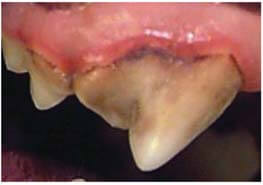
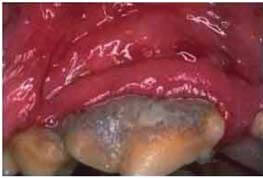
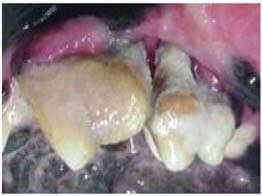
Please note that sometimes we do not know the severity of the dental disease until after the pet is under anesthesia as we cannot probe under the gumline on an animal while they are awake for their exam. If there is any unexpected dental disease, we will call you prior to performing any more involved procedures. Please be available the day of your pet’s dental cleaning in case we need to contact you.
For more information on dental care, please view this section on our Services page.
What can be done about my pet's skin allergies?
Three Main Issues
Please note that when we address skin allergies in animals, we focus on three main issues:
- flea allergies
- food allergies
- environmental allergens
Many of our allergic animals are allergic to several different things, and therefore we use several different modes to treat the allergies.
Secondary Infections
Despite the cause of the allergy, it is common for the animal to get secondary skin and/or ear infections. If we cannot get the underlying cause of the allergy under control, we often cannot get the infections under control.
Fleas
If an animal is allergic to fleas it only takes one or two fleas to produce an allergic response. It is very common for owners not to observe fleas on their cats since cats are such fastidious groomers and often pick the flea off before the owner can see the flea. Please refer to our “Flea Control Recommendations” sheet for guidelines.
Food
Often when an animal exhibits signs of skin allergies, it is secondary to an allergy to something in their food, usually a protein. Therefore it is common for our veterinarians to recommend hypoallergenic diets. If this recommendation is made, it is important to remember that this diet is the only thing that should go into the pet’s mouth for at least eight weeks.
If you combine the recommended food with any other foods, it defeats the purpose of these elimination diets. Some of our commonly used hypoallergenic foods are listed below:
- Hills Prescription Diet Dermatology Diet (D/D)
- Hills Prescription Diet Z/D
- Hills Prescription Diet Z/D ultra
- Hills Science Diet Hypoallergenic treats
Most of these foods are available in the dry and canned version. Many clients prefer to get both so that they can hide medication in the canned (remember absolutely no other food, including treats to hide pills in!)
There are many over-the-counter diets labeled as being hypoallergenic, but they are not the same as a prescription quality hypoallergenic diet.
Environmental Allergens
Environmental allergens are a little more difficult to treat because we usually cannot eliminate environmental factors as easily as we can treat fleas or change the food. We typically start conservatively and treat symptomatically with antihistamines, medicated shampoos, and fatty acid supplements.
For some dogs, these treatments work very well, and for others, we have to be more aggressive with treatments. Your veterinarian may start off by recommending:
- 3V caps (fatty acid supplement)
- Benadryl
- Chlorpheniramine (ChlorTrimeton)
- Clemastine (Tavist)
- Relief shampoo
- Malasseb shampoo
- Douxo Calm system
- Douxo Chlorhexidine system
- Douxo Calming Gel Spray
Additional Recommendations
Please note that sometimes the above recommendations are not enough for every animal with environmental allergies, and we sometimes have to make additional recommendations. Many animals with allergies do great on steroids, but due to the harmful long-term effects of steroids, we try to avoid them as much as possible. In some circumstances, we recommend allergy testing and/or specialized anti-itch medications like Apoquel, Cytopoint, or Atopica. Your veterinarian will discuss these more aggressive options with you if they are necessary.
Contact Us
We realize that allergies are a very frustrating problem for you and your pet. It is a very common problem, and the best way for your veterinarian to determine the best combination of treatments to help your pet is to follow the above recommendations. Please contact us with any questions!
What are your recommendations for flea control?
Flea Control Recommendations For Your Pet
We strongly recommend using a flea prevention product every month.
All pets (indoor and outdoor) MUST be on a monthly flea control product all year long.
We DO NOT recommend using any over-the-counter products as they are not effective and can be dangerous.
Please note that some flea control products for dogs can be toxic to cats. For example, if you use Vectra 3D on your dog, your cat should not come into contact with your dog for several hours until the product dries. The regular Vectra made for cats is safe to apply to your cat.
Application of topical products is very important:
Topical products must be applied to the skin and not just on the hair. Part the hair on the back of the neck and apply the full amount of product to your pet. DO NOT drag the tube down your pet’s back as the product will only get on the hair, and your pet may lick it off.
Your pet should not have a bath two days before or two days after applying the product. The product requires an intact oil layer to work properly.
These products are based on your pet’s weight; make sure that you are using the correct size for your pet. (Remember, cats over 15 lbs need 2 vials of Revolution applied or 1 adult size + 1 kitten size when appropriate).
The products should be stored at room temperature in your home and not in your car. If using Comfortis, it should be given with a meal.
If you continuously see fleas, this means that the environment is overpopulated (rugs and carpeting are ideal environments for fleas, flea eggs, and larvae). Each flea can lay hundreds of eggs in the environment, and those eggs hatch in 21 days and are then ready to lay more eggs.
The most effective flea control program MUST include treating the environment.
Thoroughly vacuum all carpets, rugs, furniture, etc. Discard the bag after vacuuming as the eggs will hatch in the bag.
For carpeting, rugs, and hardwood floors, we recommend Flea Busters (available in our reception area).
For large outdoor areas, we recommend either Over and Out (available at Walmart, Lowe’s, Home Depot) or Bayer Advanced Yard Protection. We also have Adam’s Yard Spray (hose attachment) available in the reception area.
For anything that cannot be thrown in the washing machine, we recommend Siphotrol Spray (available in the reception area).
If you elect to call a professional exterminator, ask specifically for flea treatment and ask them to treat more than just the perimeter of your property.
Remember that other environments can be a source of re-infestation (the car, an area where the pet is walked, someone else’s house, doormats, decks, porches, etc.).
We also have Capstar tablets which can be given orally every other day for one month to help depopulate the environment. This product is meant to be used in conjunction with monthly flea prevention.
FOR ANY OF THE ENVIRONMENTAL PRODUCTS, PLEASE READ THE APPLICATION AND SAFETY INSTRUCTIONS CAREFULLY BEFORE USING.
FLEA CONTROL PRODUCTS
Please note that this information is meant to give you a summary of flea control products that we use on a regular basis. There are other products on the market, and if you are interested in any of these other products, please let us know. There are no products that will actually prevent fleas from getting on the pet. All of these products work by killing the fleas once on the animal. For this reason, if you are having a flea problem, we recommend treating the environment. Make sure that your animal is also on an appropriate monthly heartworm prevention medication.
Again we do not recommend using over-the-counter flea products. Flea control products are available at online pharmacy.
Bravecto:
We recommend Bravecto Plus for cats and Bravecto chewable for dogs. *Bravecto kills fleas and prevents flea infestations. Bravecto Chew kills ticks (black-legged tick, American dog tick, and brown dog tick) for 12 weeks and also kills lone star ticks for 8 weeks. Bravecto Topical for Cats kills ticks (black-legged tick) for 12 weeks and American dog ticks for 8 weeks.
*Direct from the Bravecto website
How can I keep my pet safe during the holidays?
The holidays are a time when our focus is often elsewhere, which is a prime opportunity for our four-legged family members to get into trouble. Here are a few things to remember for the holidays:
Keep a watchful eye on pets.
Everyone loves a party, but sometimes the hustle and bustle can frighten animals and cause them to run away. Untrained puppies can bolt out an open door and not be missed for hours. They can easily be stepped on with all the extra feet around. Celebratory noise can be scary also. Designate a quiet, secure “pet room” away from the crowd, with plenty of food and water, and be sure that your pet is microchipped and wearing a collar with current ID tags.
Fight the temptation to feed table scraps.
Fatty holiday meats and treats can cause a number of gastrointestinal problems, while bones can cause bowel obstructions or choking. Remember NO chocolate for pets! The sweet stuff contains a chemical that can be highly toxic to pets. Try buying a fancy treat made especially for pets as a special holiday indulgence.
Place holiday plants out of reach.
Holiday plants such as mistletoe, poinsettias, holly, and lilies can poison or make your pet very sick. Dogs tend to chew on or eat pine needles which can cause internal damage. Don’t allow pets to drink tree water – it can be harmful too.
Keep holiday decorations away from pets.
Shiny, fun-looking decorations and things that smell interesting are instant new toys for pets. Ingestion of glass, metal ribbons, or tinsel can lead to serious medical emergencies. Snow globes and artificial snow contain chemicals that can be harmful if ingested or inhaled. Dogs that like to chew might be enticed by all the extension cords and wires lying around. Help your pets avoid a shocking experience by purchasing wire and cord protectors.
Alcohol and Drugs
Along with holiday food often come cocktails and/or drugs. Both are extremely harmful and potentially deadly for pets. It doesn’t take much to make a cat or dog very sick. If your pet mingles with guests, ask them to keep their food and drinks and anything ingestible out of your pet’s reach.
Cars
If you are traveling with your pet – whether just down the street or to visit family or friends out of town, it is safest to make sure they are properly restrained. You may be the safest driver on the road, but you never know about the “other guy.” Use a seat belt harness or a kennel that fits in the car.
Cold Weather Hazards
De-icing products, salt, and ice can get into fur and paws, causing skin irritation or more serious problems. Be sure to wipe your pet’s paws thoroughly and their tummy, too, when they come in from the cold. Take care to wipe up any spilled antifreeze. Dogs and cats love the sweet taste. Better yet, use pet-friendly antifreeze products!
HAVE A HAPPY AND SAFE HOLIDAY SEASON!
What is canine influenza virus?
What You Need To Know About the Dog Flu
You can get the flu, but did you know your dog can as well? It’s called canine influenza (CIV) – or dog flu – and cases of it have been popping up all over the country. In fact, canine influenza has impacted dogs in more than half the country – just since March 2015 – and new cases are being diagnosed every week. It’s made dogs sick (some very ill), and six dogs have died as a result of CIV.
As a pet owner, here’s what you need to know. There are two strains of canine influenza – H3N8 and H3N2. H3N8 has been around for several years, but H3N2, an Asian strain of CIV, is brand new in the United States, which means dogs have not been exposed to it before and have no immunity.
A dog may have the CIV H3N2 for up to 24 days, which means the dog is contagious and spreading the disease throughout that time period. As a result, the infection can spread quickly among social dogs in inner cities, doggie daycares, boarding facilities, dog parks, sporting and show events, and any location where dogs commingle. H3N2 is also incredibly contagious. It can be spread easily by direct contact with infected dogs (sniffing, licking, nuzzling), through the air (coughing, barking, or sneezing, and by contact with contaminated objects such as dog bowls and clothing.
Protect Your Dog
- To prevent the spread of disease, wash your hands with soap and water or disinfect them with an alcohol-based hand sanitizer after contact with dogs.
- Dog owners whose dogs are coughing or showing other signs of respiratory disease should not participate in activities or bring their dogs to facilities where other dogs can be exposed to the virus.
- Consider vaccination against CIV based on your dog’s lifestyle and risk factors. If you answer yes to one or more of the questions below, your dog is at greater risk for contracting canine influenza.
Does your dog:
- Visit doggie daycare?
- Board at a boarding facility or pet hotel?
- Attend training classes?
- Play at dog parks?
- Participate in dog-friendly events?
- Attend dog shows or sporting events?
- Often greet other dogs during walks?
Signs of CIV
Call your veterinarian immediately if your dog has the following symptoms:
- Coughing
- Lack of energy
- Loss of appetite
- Discharge from eyes or nose
If you’d like more information about canine influenza, please call our office. You also will find valuable pet owner information at dogflu.com.
Why Bravecto?
Is Your Dog Protected?
- One dose of Bravecto protects your dog for nearly 3X longer than one dose of any monthly treatment.
Why Bravecto?
- Extended protection in just 1 chew
- Available for dogs of all sizes
- Starts killing fleas & ticks within hours
- FDA evaluated and proven effective
- The first and only U.S. product with protection against the Asian long-horned tick
Ask our team about Bravecto at your next visit!
Why ProHeart?
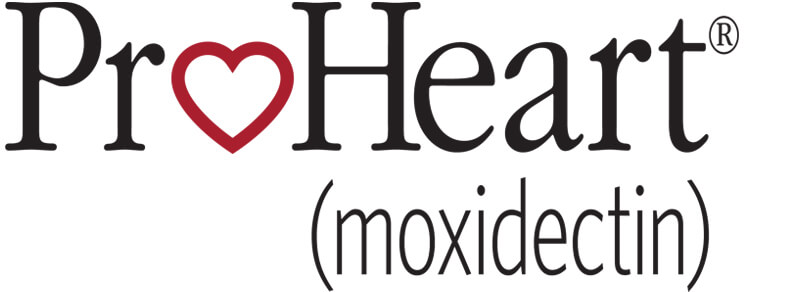
Is Your Dog Protected?
- Take the Dog Heartworm Quiz CLICK HERE
Why ProHeart?
- It can be tough to remember monthly medications for your dog
- Heartworm disease is a year-round threat.
- With no monthly doses to remember, there are no gaps in protection
With ProHeart You Have 2 Options:
- ProHeart 6 (twice yearly dose)
- ProHeart 12 (one dose provides year-round protection
Ask us about the benefits of adding ProHeart 6 or ProHeart 12 to your dog's preventative care plan.
How do I obtain a Travel Certificate for my pet?
To learn more about the timeline and process for obtaining a Travel Certificate for your pet, visit HERE.
Please complete this FORM prior to scheduling your appointment.
*It is important to start this process as early as possible because it can take several weeks to several months to meet all the requirements.
